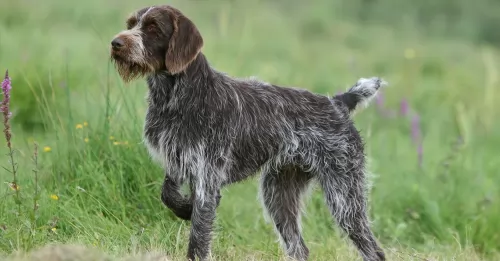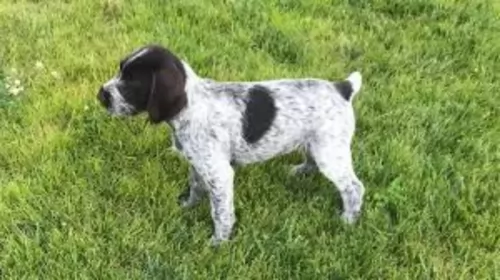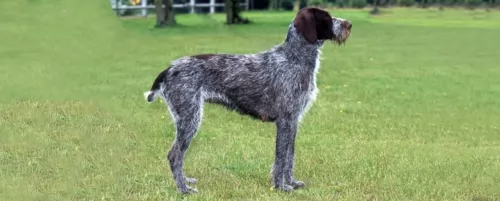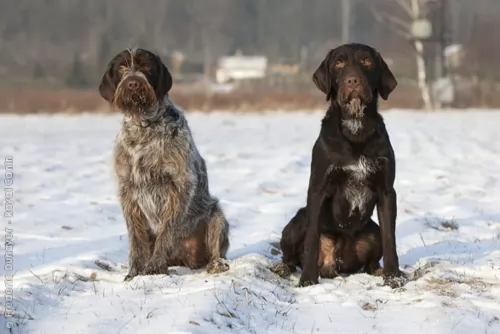 Petzlover
Petzlover Cesky Fousek is originated from Czech Republic but Shiba Inu is originated from Japan. Cesky Fousek may grow 23 cm / 10 inches higher than Shiba Inu. Cesky Fousek may weigh 17 kg / 38 pounds more than Shiba Inu. Both Cesky Fousek and Shiba Inu has same life span. Both Cesky Fousek and Shiba Inu has almost same litter size. Both Cesky Fousek and Shiba Inu requires Low Maintenance.
Cesky Fousek is originated from Czech Republic but Shiba Inu is originated from Japan. Cesky Fousek may grow 23 cm / 10 inches higher than Shiba Inu. Cesky Fousek may weigh 17 kg / 38 pounds more than Shiba Inu. Both Cesky Fousek and Shiba Inu has same life span. Both Cesky Fousek and Shiba Inu has almost same litter size. Both Cesky Fousek and Shiba Inu requires Low Maintenance.
 The Cesky Fousek is also known as the Bohemian Wire-Haired Pointing Griffon and he hails from the Czech Republic. The name ‘Fousek’ is referring to the dogs facial hair.
The Cesky Fousek is also known as the Bohemian Wire-Haired Pointing Griffon and he hails from the Czech Republic. The name ‘Fousek’ is referring to the dogs facial hair.
With World War 1, the dog all but disappeared, but with careful breeding, its numbers have built up. Today the dog is a popular hunting breed in its home country. In 1957 and 1958, Czechoslovakia joined the Federation Cynologique Internationale, and this is when a new breed standard was written and approved. In 1964, the dog breed was recognized by the FCI and by the United Kennel Club in 1996.
The Cesky Fousek has even been represented on postage stamps issued in the country in 1965, and again in 1973. Today, the breed is as popular as ever in the Czech Republic as well as other countries where there are breeding programs.
 The Shiba Inu hails from Japan and was a dog bred to hunt birds and small game. The dog is one of 6 native breeds in Japan. Today he is essentially a companion dog in both Japan and the United States.
The Shiba Inu hails from Japan and was a dog bred to hunt birds and small game. The dog is one of 6 native breeds in Japan. Today he is essentially a companion dog in both Japan and the United States.
He is actually one of the smaller spitz dogs in the country but known for his boldness.
The first Shiba Inu was imported into the United States in 1954 and was recognized by their Kennel Club in the Miscellaneous Class and also the Non-Sporting Group.
 The Cesky Fousek is a medium sized dog with both the male and the female standing between 58 – 66cm and weighing 22–28kg. The dog has a fairly distinctive appearance, looking quite a bit like a German Wire-haired Pointer, but he has the mustache and beard which the Pointer doesn’t have.
The Cesky Fousek is a medium sized dog with both the male and the female standing between 58 – 66cm and weighing 22–28kg. The dog has a fairly distinctive appearance, looking quite a bit like a German Wire-haired Pointer, but he has the mustache and beard which the Pointer doesn’t have.
The tail of this dog is carried horizontally and is generally docked to 3/5 of its natural length to give the dog a distinctive look. These days, with regulations around docking, the tail is left long. The ears are floppy and rounded at the tips and the eyes are brown.
The dog’s coat is short to medium length and fairly coarse with colors being dark roan or brown with ticked markings.
The Cesky Fousek is an energetic, eager-to-please dog and he just loves playing with the children in the home. He is an intelligent dog who is loyal, social and protective and you’ll find that he is easy to train. In fact, with socialization and training, he becomes obedient and amicable around adults, children and other pets.
 The Shiba Inu is a medium sized, athletic dog standing at between 33cm and 43cm in height both male and female and weighing in the region of 6 to 11kg.
The Shiba Inu is a medium sized, athletic dog standing at between 33cm and 43cm in height both male and female and weighing in the region of 6 to 11kg.
He is an agile dog, known for his feline agility. He has the typical spitz dog erect ears and slanted eyes with the tail curling over the back.
The coat is available in a number of colors – cream, red, sesame, black and tan.The double coat is thick and is made up of straight, stiff kind of hair.
This is an intelligent, independent, alert, strong willed dog who has a calm aura about him. He is stubborn too, so it will be best to have him trained or socialized just to make him more amicable to get along with.
As he is a dog that just loves his human family, this training helps him to get along with other dogs too. He is possessive with his human family, wanting to guard them and everything he regards as his territory.
 The Cesky Fousek is a fun loving, good natured dog who is always up for a game. This is why he isn’t a dog that will fit into an apartment or shoe-box size garden.
The Cesky Fousek is a fun loving, good natured dog who is always up for a game. This is why he isn’t a dog that will fit into an apartment or shoe-box size garden.
Socialize and train him and he becomes a wonderful family pet, good around children and other pets. He loves human companionship and isn’t a dog to be left outside to run around on his own.
The Cesky Fousek is easy to train, and when he is treated properly and made to feel an important member of the family, he provides you with his unconditional love and friendship.
 He is the smallest of several spitz dogs that originated in Japan. He is known for his bold, feisty personality and for being so good natured as well. Other excellent characteristics are intelligence, strong-willed, loyal and loving and he has a calm, confident dignity around him.
He is the smallest of several spitz dogs that originated in Japan. He is known for his bold, feisty personality and for being so good natured as well. Other excellent characteristics are intelligence, strong-willed, loyal and loving and he has a calm, confident dignity around him.
He will get on well with kids and other dogs he has grown up with but he can be a bit aggressive towards dogs he doesn’t know.
Always ensure good exercise. Getting outside and active is important for this dog.
You can certainly benefit from having this wonderful dog in your life as he has some excellent characteristics.
 The average lifespan of this dog breed is about 12 to 15 years, and even though he is a robust breed, some common health issues do exist.
The average lifespan of this dog breed is about 12 to 15 years, and even though he is a robust breed, some common health issues do exist.
Certainly if you’re considering breeding for your Cesky Fousek, you’ll want to have him tested for dysplasia, eye problems and Von Willebrands Disease.
Von Willebrands Disease is an inherited bleeding disorder, caused by a deficiency in the amount of a specific protein needed to help platelets.Often the dog doesn’t show outward evidence of having the disease while other dogs might even hemorrhage from the nose or elsewhere.
 Shiba Inus are generally healthy, but like all breeds, they're prone to certain health conditions. Look out for things such as hip dysplasia, hypothyroidism, bloat, cancer, eye diseases and skin allergies.
Shiba Inus are generally healthy, but like all breeds, they're prone to certain health conditions. Look out for things such as hip dysplasia, hypothyroidism, bloat, cancer, eye diseases and skin allergies.
Skin allergies can come about because of being allergic to food, fleas, too much shampooing and some medications. It can be traumatic for your pet who will sometimes chew and bite to get relief. Treatment varies but get your pet to the vet.
There is pressure in the eye, and symptoms can include vision loss and pain. Glaucoma can be treated with eye drops but sometimes surgery is required.
 The coat of the Cesky Fousek is easy to maintain and you’ll want to brush him at least twice a week with a firm bristle brush to get through the coarse hair and rid him of loose hairs.
The coat of the Cesky Fousek is easy to maintain and you’ll want to brush him at least twice a week with a firm bristle brush to get through the coarse hair and rid him of loose hairs.
Ear infections are common in dogs, but dogs with floppy ears are more susceptible to ear infections than dogs with erect ears. The infection often starts in the external ear canal and occurs when excess bacteria grows in the ear canal and it becomes inflamed.
Always take your pet to the veterinarian at the first sign of an ear infection. You’ll notice your pet shaking his head and the ear may well be red and inflamed. Your vet will discuss the proper treatment and suggest ways to prevent recurrence. The vet may also recommend an ear cleaning solution as well.
This dog breed needs plenty of exercise and he’ll love his daily walks with you. Put him on a leash and allow him to run with you when you go cycling or jogging.
This is a very active dog used to hunting and he’ll require good quality protein. Speak to your vet about how many calories your dog will need each day, more so if you have a puppy and are unsure in terms of his growth.
He is a medium-to-large breed so you’ll want a food that caters for his size, his age and his energy. Include portions of rice, vegetable and meat into his kibble from time to time for variety, and never forget to include some raw meat into his diet.
Fresh, cool water is of critical importance and should be available night and day.
 A nice long walk out and about in the neighborhood is good for this dog. Apart from a daily workout, he will love to come running with you or if you go cycling, he will run next to you. He will require exercise every day.
A nice long walk out and about in the neighborhood is good for this dog. Apart from a daily workout, he will love to come running with you or if you go cycling, he will run next to you. He will require exercise every day.
Brushing your Shiba Inu will be required at least twice a week as he is a dog that sheds quite a bit throughout the year. You want to get rid of those loose hairs to keep him looking nice and groomed.
Never pop sugary treats into your pets mouth and avoid feeding him spicy, toxic foods. It can drastically upset his digestion.
You can feed your Shiba Inu commercially manufactured food but it should be the best quality ones. Give him some tasty homemade food too. Simply add into one big pot chicken, brown rice or pasta and spinach, sweet potatoes and carrots. This food can all be chopped up, refrigerated and added warmed up and in small portions to your pets dry kibble once or twice a week.
Try and also give him some raw meat occasionally. Ensure that there is always a bowl of fresh, cool water within his reach.